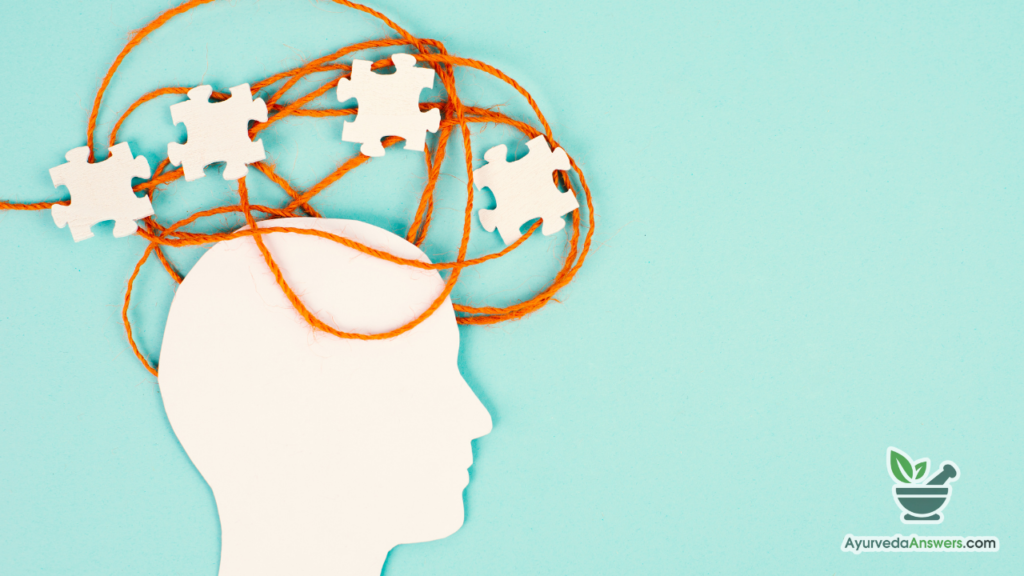
In the fast-paced rhythm of modern life, the mind can often find itself entangled in the web of stress, anxiety, and imbalance. But fear not, for Ayurveda, the ancient science of life, offers a holistic approach to mental well-being, guiding us back to a state of harmony and tranquility.
Let us embark on a journey through the gentle remedies, nourishing practices, and timeless wisdom of Ayurveda, as we nurture the sacred bond between mind and body.
Understanding Mental Health through an Ayurvedic Lens 🌿
In Ayurveda, mental health is viewed as an integral part of overall well-being, encompassing not just the absence of illness but the presence of balance, vitality, and joy.
It is influenced by the balance of the three doshas (Vata, Pitta, and Kapha), the state of Agni (digestive fire), the purity of bodily tissues (Dhatus), and the clarity of the mind (Sattva).
Mental disorders are seen as imbalances in these fundamental aspects of the individual, resulting in symptoms such as stress, anxiety, depression, and cognitive disturbances.

Common Mental Health Issues According to Ayurveda 🤔
Ayurveda recognizes a range of mental health issues, including:
- Anxiety Disorders: Excessive worry, fear, or nervousness that interferes with daily functioning.
- Depressive Disorders: Persistent feelings of sadness, hopelessness, or loss of interest in activities.
- Stress-related Disorders: Physical, emotional, or psychological symptoms resulting from chronic stress or trauma.
- Sleep Disorders: Disturbances in sleep patterns, such as insomnia, hypersomnia, or disrupted sleep-wake cycles.
- Cognitive Disorders: Impairments in memory, concentration, or cognitive function due to aging or neurological conditions.
Causes of Mental Health Issues According to Ayurveda 🌱
Ayurveda identifies several factors that can contribute to mental health imbalances:

- Dosha Imbalances: Excess Vata dosha can lead to anxiety, fear, and restlessness, while excess Pitta dosha can manifest as irritability, anger, and aggression. Excess Kapha dosha can result in lethargy, depression, and emotional stagnation.
- Agni Imbalance: Weak Agni (digestive fire) can lead to the accumulation of toxins (ama) in the body and mind, contributing to mental fog, lethargy, and emotional instability.
- Sattva Disturbances: Lack of clarity, purity, and balance in the mind (Sattva) can lead to negative emotions, distorted perceptions, and impaired cognitive function.
- Stress and Trauma: Physical or emotional stress, trauma, or unresolved emotions can disrupt the nervous system, alter brain chemistry, and contribute to mental health issues.
- Lifestyle Factors: Unhealthy lifestyle habits such as poor diet, inadequate sleep, lack of exercise, and excessive sensory stimulation can impair mental health and contribute to imbalances.
Prevention: Cultivating Mental Well-Being Naturally 🌟
Prevention is key to maintaining mental well-being and resilience. Ayurveda offers holistic strategies to cultivate mental health and prevent imbalances:

- Balanced Lifestyle: Establish a daily routine (Dinacharya) that includes adequate rest, regular exercise, nourishing meals, and stress-reducing activities to support overall well-being.
- Mindful Nutrition: Eat a balanced diet that includes whole, fresh foods rich in nutrients, antioxidants, and vital energy. Include foods that support mental clarity, such as fresh fruits, vegetables, whole grains, nuts, seeds, and healthy fats.
- Stress Management: Practice stress-reducing techniques such as yoga, meditation, deep breathing exercises, and mindfulness to calm the mind, reduce anxiety, and promote emotional resilience.
- Herbal Support: Take adaptogenic herbs such as Ashwagandha, Brahmi, Tulsi, and Shatavari to support the nervous system, improve resilience to stress, and promote mental clarity.
- Emotional Release: Engage in practices that facilitate emotional expression and release, such as journaling, creative arts, music therapy, or talking to a trusted friend or counselor.
Treatment: Nurturing the Mind-Body Connection 🌸
In addition to prevention, Ayurveda offers gentle and effective remedies to alleviate symptoms and promote mental well-being:

- Herbal Remedies: Take herbal supplements or decoctions that support mental health, such as Ashwagandha capsules, Brahmi powder, Tulsi tea, or Jatamansi churna.
- Ayurvedic Therapies: Explore Ayurvedic therapies such as Shirodhara (warm oil therapy), Nasya (nasal oil therapy), Abhyanga (oil massage), or Panchakarma (detoxification) to calm the mind, balance the doshas, and promote relaxation.
- Yoga and Pranayama: Practice yoga asanas (postures) and pranayama (breathing techniques) that support mental health, such as Surya Namaskar (Sun Salutation), Viparita Karani (Legs-up-the-Wall pose), and Nadi Shodhana (Alternate Nostril Breathing).
- Meditation and Mindfulness: Cultivate a regular meditation practice to quiet the mind, enhance self-awareness, and promote inner peace. Practice mindfulness in daily activities to stay present, focused, and centered.
- Sattvic Diet: Follow a Sattvic diet that includes pure, fresh, and light foods that nourish the body and mind without causing heaviness or dullness. Include foods such as fresh fruits, vegetables, whole grains, legumes, nuts, seeds, and herbal teas.
Conclusion:
In the garden of the mind, the seeds of well-being are sown with care, nurtured with love, and tended with mindfulness. With Ayurveda as our guide, we cultivate the soil of our consciousness, nourish the roots of our being, and blossom into the radiant expression of our true selves. Let us embrace the gentle remedies, nourishing practices, and timeless wisdom of Ayurveda as we embark on a journey of mental wellness and self-discovery. May you find solace in the stillness, clarity in the chaos, and joy in the journey of healing and transformation. 🌸
Disclaimer : The techniques described in these articles are not intended as substitutes for professional medical advice or treatment. Consult a physician before trying any new health treatment. Do not stop or change prescribed medications without consulting your healthcare provider. The information provided is for educational purposes only. Results will vary based on individual factors. Always rely on the guidance of a qualified medical professional for any health concerns.
Read Our Latest Articles:
- Ayurveda for Disc Bulge: Finding Relief Naturally
- Ayurveda for Alopecia Areata: Nurturing Hair Health Naturally
- Ayurveda for Asthma: Breathe Easy with Natural Solutions
- Ayurveda for Melasma: Embracing Natural Solutions for Clear, Radiant Skin
- Ayurveda for Dampness in the Body: Embracing Balance and Vitality
Leave a Reply